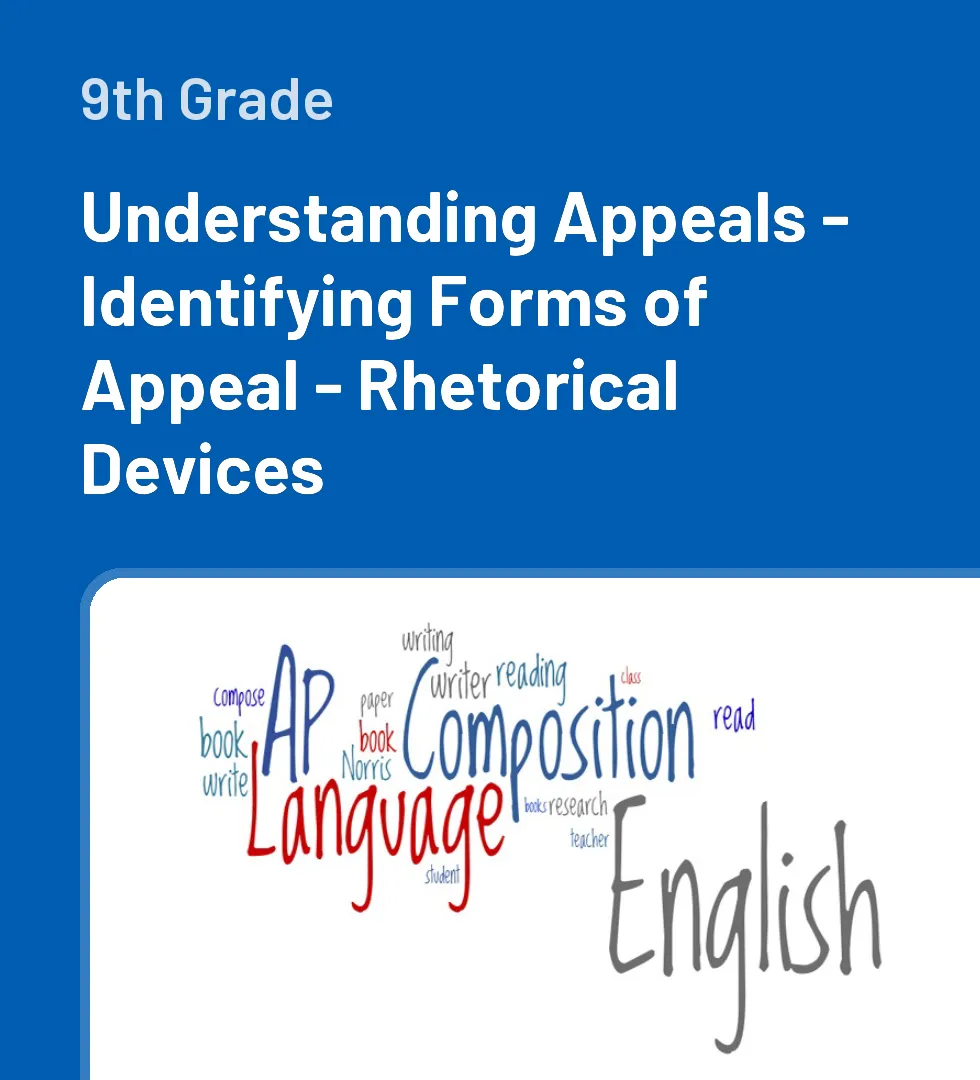Classify Logical Fallacies Quizzes
Filter your results

Assessment
Understanding Appeals - Identifying Forms of Appeal - Rhetorical Devices
9th Grade
English
Focusing on the rhetorical devices of logos, ethos, and pathos, the content provides examples and exercises to help learners grasp their definitions and applications. Engaging with the material enhances learners' ability to identify and effectively apply these persuasive techniques in writing, ultimately improving their persuasive communication skills.
See more

Assessment
Research Skills - Credibility and Logical Fallacies - English Language Arts
9th Grade
English
Students develop critical research skills by learning to identify credible information, craft effective research questions, and recognize logical fallacies. These skills enhance analytical capabilities for academic research and beyond.
See more

Assessment
Engaging Language Exercises - Vocabulary and Sentence Structure
9th Grade
English
Engaging activities improve vocabulary and sentence structure for Grade 9 students, enhancing language skills and expanding understanding of sentence formation. These efforts contribute to enhanced communication abilities.
See more

Assessment
Understanding Narrative Texts - Elements and Identification
9th Grade
English
Explore key elements of narrative texts by identifying characters and matching them to their respective stories. Enhance comprehension of narrative structures and improve analytical skills regarding story components and moral values.
See more

Assessment
Logical Reasoning - Identifying and Understanding Logical Fallacies
9th Grade - 10th Grade
English
Focus on identifying and understanding logical fallacies in reasoning to recognize flawed statements that often appear true. Enhance analytical skills and improve the ability to assess arguments critically. This will enable avoidance of common reasoning errors in writing and discussions. Emphasize subject matter comprehension, learning goals, and the critical evaluation process.
See more

Assessment
Critical Thinking - Unreliable Sources - Logical Fallacies
10th Grade
English
Discover key strategies for assessing source reliability and understanding logical fallacies. Gain skills to evaluate information credibility and apply critical thinking to recognize fallacies in arguments.
See more

Assessment
Vocabulary and Grammar - Language Skills - Insight Intermediate
11th Grade
English
Engage with key vocabulary and grammar concepts to enhance language proficiency through various exercises. Develop the ability to identify and use advanced vocabulary, construct grammatically correct sentences, and grasp language nuances, ultimately improving communication skills.
See more

Assessment
Claims and Reasoning - Argumentative Writing - AP Comp English Language
11th Grade
English
Focus is placed on understanding the key elements of argumentative writing, specifically claims, evidence, and reasoning. Learners will improve their capability to construct and defend arguments effectively while honing critical thinking skills essential for advanced English studies.
See more

Assessment
Logical Fallacies - Identification & Examples
11th Grade
English
Explore logical fallacies and their impact on arguments and reasoning. Enhance critical thinking and argumentation skills by identifying and understanding common fallacies.
See more

Assessment
Logical Fallacies - Literary Terms - Rhetorical Analysis
9th Grade - 12th Grade
English
Exploration of logical fallacies and literary terms enhances understanding of rhetorical analysis. Learners gain proficiency in identifying common fallacies and literary devices, improving critical thinking and analytical skills.
See more

Assessment
Figurative Language Identification - Literary Concepts - English Literature
12th Grade
English
Identify and understand various types of figurative language within English literature. Enhance skills in recognizing similes, metaphors, and personification, thereby improving the ability to analyze literary techniques and their applications in textual analysis.
See more

Assessment
Logical Reasoning - Types & Structures - Argumentation Techniques
11th Grade - University
English
Explore logical reasoning, focusing on the structures of deductive and inductive reasoning within argumentative contexts. Enhance analytical skills to identify logical structures, improve critical thinking abilities, and develop the capacity to effectively evaluate arguments and conclusions.
See more

Assessment
Argument Analysis - Supporting and Counterarguments - English Studies
10th Grade - University
English
Engage in a thorough examination of argument analysis, concentrating on recognizing and evaluating supporting and counterarguments within English studies. Develop skills in critical assessment, logical reasoning, and the application of rhetorical devices in written texts.
See more

Assessment
Critical Thinking - Identifying and Understanding Logical Fallacies
12th Grade - University
English
Other
Master the art of identifying logical fallacies and understanding their impact on arguments to boost critical thinking skills. Learn to effectively evaluate information and arguments, equipping yourself with essential tools for critical analysis.
See more

Assessment
Logical Reasoning - Identifying Logical Fallacies - Critical Thinking
8th Grade - University
English
Engage with the core principles of logical fallacies through multiple-choice questions. By participating, learners will enhance critical thinking skills and develop the ability to identify widespread fallacies in arguments, thereby strengthening analytical abilities in both academic and real-world settings.
See more

Assessment
Logical Fallacies - Analytical Skills
9th Grade
English
Engage with intriguing questions to explore the concept of logical fallacies, challenging critical thinking skills. Improve your ability to identify and analyze different types of logical fallacies, enhancing argumentation and reasoning abilities.
See more

Assessment
Argumentation Skills - Evaluating Supporting Statements - Argumentative Writing
9th Grade
English
Focuses on developing critical thinking skills through evaluating arguments in diverse contexts. Enhances abilities to assess supporting statements and construct well-reasoned arguments, strengthening argumentative writing capabilities.
See more

Assessment
Fallacy Identification - Logical Arguments in Literature and Media
9th Grade
English
Other
Analyze logical fallacies through examples from literature, media, and real-life situations. Develop critical thinking skills by identifying fallacies such as Ad Hominem and Slippery Slope to enhance analytical abilities.
See more

Assessment
Logical Reasoning - Logical Fallacies - English II
10th Grade
English
Participants will enhance critical thinking skills by learning to recognize and evaluate logical fallacies, such as ad hominem attacks and circular reasoning. The program aims to enable students to apply logical reasoning principles in debates and discussions, thereby improving argumentation skills in real-world contexts.
See more

Assessment
Identifying Logical Fallacies - Argument Evaluation - Critical Thinking
10th Grade
English
Other
Focus on identifying various logical fallacies to enhance argument evaluation and critical thinking skills. Completing this will improve the ability to discern faulty logic in arguments, thereby strengthening analytical and reasoning capabilities.
See more

